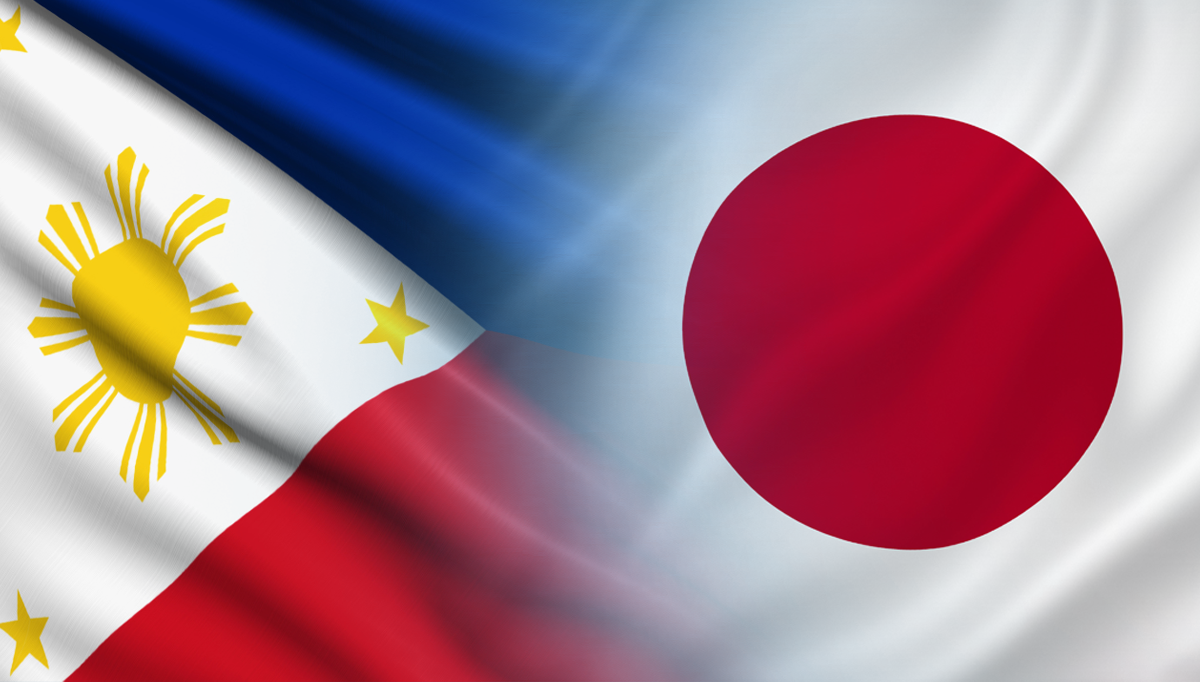
Philippines-Japan flags. INQUIRER FILE PHOTOS
Japan enhancing defense cooperation with the Philippines and the United States, among other allies, is “a very natural course of action,” a Japanese foreign policy expert said as he noted his country’s own maritime dispute with China.
“We are very, very serious about it. They [Japanese officials] are working on the wording, title. I’m sure we can reach an agreement sooner or later,” Kunihiko Miyake, research director of Japan-based think tank Canon Institute for Global Studies, said at a forum on Friday organized by the Stratbase ADR Institute.
Miyake noted that unlike in Europe, there is no organization such as the North Atlantic Treaty Organization (Nato) between Japan and its allies in the Pacific.
He cited China’s incursions into the waters of the Senkaku Islands northeast of Taiwan.
The dispute gives rise to the need for Japan to enter into defense cooperation arrangements with its allies, said Miyake, a former diplomat who had served the Japanese foreign ministry for more than two decades.
No appeasement
“It’s important for the two nations (Japan and the Philippines) to cooperate with powerful like-minded countries like the US and Australia,” he said. “Because if we just appease the other side, they might misunderstand our intention. Our intention is not to appease and let them do what they want to do. Our intention is to encourage them not to do it.” “We need to show our capability to do this while we continue to talk to them in a dialogue with like-minded countries,” Miyake also said.
The uninhabited Senkaku Islands—which China calls the Diaoyu Islands—“are indisputably an inherent part of the territory of Japan,” the country’s Ministry of Foreign Affairs said in a post on its website in September last year.
READ: Gov’t to review defense deal with Japan, US
It noted that “China Coast Guard ships persistently continue unilateral attempts to change the status quo by force or coercion in the waters around the Senkaku Islands.”
“This includes approaching Japanese fishing vessels inside Japanese territorial waters and intrusions by ships mounted with artillery,” the ministry added.
‘Shaken’ order
But the Japanese Embassy on Wednesday clarified remarks made by Philippine Ambassador to the United States Jose Manuel Romualdez that Japan and Australia may be among the countries that would take part in joint maritime patrols being discussed between the Philippines and the United States.
READ: Aussie envoy confirms joint patrol talks with PH, US, Japan
Responding to Romualdez’s statements as recently quoted by Reuters, the embassy said there was still no talks on that matter.
Still, the embassy’s Deputy Chief of Mission Kenichi Matsuda, also speaking at the Stratbase forum, acknowledged the security risks presented by China’s claims over the South China Sea.
“As the very foundation of international order is being shaken, the importance now of a free and open international order based on the rule of law is increasing,” he said.
“Japan shares with the Philippines the importance of international law, particularly the Unclos (United Nations Convention on the Law of the Sea) and the 2016 arbitration award,” he also said, referring to the arbitral case that the Philippines brought to the Permanent Court of Arbitration in The Hague.
The 2016 ruling upheld the country’s assertion of sovereignty over its exclusive economic zone, in line with the provisions in Unclos, and rejected China’s claim over the West Philippine Sea.
READ: PH wins arbitration case over South China Sea
Also on Friday, the Indonesian Embassy in Manila confirmed that representatives of China and the member states of the Association of Southeast Asian Nations (Asean) will meet in Jakarta from March 8 to March 10 to again discuss the proposed Code of Conduct (COC) on the South China Sea.
According to the US think tank Foreign Policy Research Institute, the proposed code was “hatched by Asean in the late 1990s” yet its “prospect has … done little to foster more cohesion among Southeast Asia’s claimants to the South China Sea [as] they have generally pursued independent strategies.”
Early last month Indonesia, as chair of this year’s Asean meetings, said it would intensify talks on the COC with China.
Following a meeting with her counterparts in Jakarta on Feb. 3, Indonesian Foreign Minister Retno Marsurdi said Asean’s member states were “commit[ed] … to conclude the negotiation of the COC as soon as possible.”
RELATED STORY
PH, Japan boost cooperation on ICT

